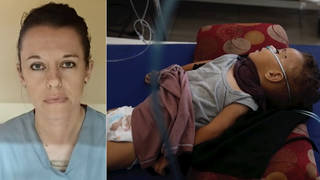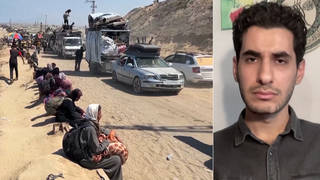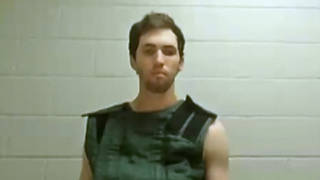Hi there,
From our first broadcast nearly 30 years ago, Democracy Now! has always been fiercely independent. Over these last 3 decades, our daily global news hour has been a source of truth in a media landscape all too often bought by commercial interests. Can you start a monthly donation? Monthly donations are the lifeblood of Democracy Now!.Can you start a monthly donation? Monthly donors represent more than 20 percent of our annual revenue. Every dollar makes a difference. Thank you so much.
Democracy Now!
Amy Goodman
Hi there,
From our first broadcast nearly 30 years ago, Democracy Now! has always been fiercely independent. Over these last 3 decades, our daily global news hour has been a source of truth in a media landscape all too often bought by commercial interests. Can you start a monthly donation? Monthly donations are the lifeblood of Democracy Now!.Can you start a monthly donation? Monthly donors represent more than 20 percent of our annual revenue. Every dollar makes a difference. Thank you so much.
Democracy Now!
Amy Goodman
Non-commercial news needs your support.
We rely on contributions from you, our viewers and listeners to do our work. If you visit us daily or weekly or even just once a month, now is a great time to make your monthly contribution.
Please do your part today.
HeadlinesAugust 24, 2007
Gen. Pace to Advise Bush to Cut Troops in Iraq by Half
The Los Angeles Times reports General Peter Pace, the chair of the Joint Chiefs of Staff, is expected to advise President Bush to reduce the U.S. forces in Iraq next year by almost half. Administration and military officials say Pace is likely to convey concerns that keeping well in excess of 100,000 troops in Iraq through 2008 will severely strain the military.
Key Republican Senator Urges Bush to Begin Withdrawing Troops
This comes as a top Senate Republican is urging President Bush to begin withdrawing troops from Iraq. John Warner of Virginia said on Thursday at least 5,000 troops should be brought home by Christmas. Warner said the president needs to send a sharp and clear message to the Middle East and voters at home.
Sen. John Warner: “I think no clearer form of that than if the president were to announce on the 15th that, in consultation with our senior military commanders, he’s decided to initiate the first step in a withdrawal of our forces.”
While Senator Warner urged Bush to begin withdrawing troops, he argued that it was not the role of Congress to mandate it.
Intelligence Report: Violence Will Remain High for Next 12 Months
Meanwhile, a new national intelligence assessment on Iraq indicates President Bush’s so-called surge has done little to bridge sectarian divides in Iraq and that the level of overall violence will remain high over the next six to 12 months. The report concludes that the Iraqi government will become more precarious during the next year and its security forces still cannot operate independently. The report also suggests that the Bush administration might be undercutting the central government by forming alliances with former Sunni insurgents.
Number of Internal Iraqi Refugees Soars Since Start of Surge
Meanwhile, The New York Times reports the number of Iraqis fleeing their homes due to sectarian violence has soared since the so-called surge began in February. The U.N.’s International Organization for Migration found that in recent months the rate of displacement in Baghdad had increased by as much as a factor of 20.
U.S. Officer Recommends Dropping Haditha Charges
In other Iraq news, a U.S. military officer is recommending that all charges should be dropped against a marine accused of murdering Iraqi civilians, including children, in the town of Haditha. Lance Cpl. Stephen Tatum has been charged with unpremeditated murder of two girls and negligent homicide on suspicion that he unlawfully killed two men, a woman and a boy. On Thursday, investigating officer, Lt. Col. Paul Ware, admitted Tatum had shot and killed civilians, but he said the evidence was too weak for a court-martial.
Bush Administration Admits Telecoms Aided Gov’t Spying
The Bush administration has acknowledged for the first time that telecommunications companies collaborated with the government’s warrantless domestic surveillance program. The Director of National Intelligence Mike McConnell made the admission in an interview with the El Paso Times. The Washington Post reports McConnell’s statement could help plaintiffs in lawsuits against AT&T, Verizon, MCI and other telecoms. Until now the government has argued that the cases should be thrown out on the grounds that the subject matter is a state secret. During the same interview, McConnell urged Congress to retroactively provide immunity to telecom companies that participated in the surveillance program.
Jose Padilla Sues Donald Rumsfeld, 59 Other Officials
The Christian Science Monitor is reporting Jose Padilla is suing former Defense Secretary Donald Rumsfeld and 59 other U.S. officials for psychologically abusing him while he was held as an enemy combatant from 2002 to 2006. The lawsuit was filed earlier this year, but his lawyers did not disclose it until this week.
Amnesty: Sudan Still Sending Arms to Darfur
In news from Africa, Amnesty International has accused the Sudanese government of continuing to send weapons to Darfur in violation of a U.N. arms embargo and a peace deal in the region. Amnesty released photos taken at an airport in West Darfur purportedly of Sudanese military aircraft and Russian-made attack helicopters. Amnesty said the continued influx of arms into the region has led to increased attacks.
Canadian Police Admit Using Undercover Officers at Protest
In Canada, police in Quebec have admitted they used undercover police officers disguised as demonstrators during the recent protests against the North American leaders summit in Montebello Quebec. Police were forced to make the admission after a video posted on YouTube showed three masked men apparently trying to provoke the crowd and instigate violence. One of the masked men was carrying a rock. The masked men were caught on tape near a line of riot police during a nonviolent protest led by union workers. Shortly after one of the union leaders accused the masked men of being police officers and provocateurs, the men pushed their way into a line of riot police. While the riot police handcuffed them, protesters noticed the men were wearing the identical boots as the riot police officers. On Tuesday, union leader David Coles first accused the masked men of being undercover police officers.
David Coles, union leader: “We’ve got some peaceful protesters down there we’ve got to protect.”
Unidentified woman: “They were police provocateurs. Not those people. They’re back in there. They crossed back into the police line.”
David Coles: “They’re trying to create a riot so that they can suck us all in to get beat up.”
Unidentified man: “And how do you know it’s a [inaudible]” —
David Coles: “He stopped us. I looked him in his eye and said, ’You’re a cop, aren’t ya?’ And his eyes just glazed right up. And I tried to take his mask off. We took it off. We got pictures. They’re provocateurs!”
The police in Quebec defended their actions, saying the undercover officers were not acting as instigators and did not commit any criminal acts.
White House Manual Advised How to Prevent Anti-Bush Protests
It has been revealed that the White House published a manual in 2002 detailing how to deter protests at President Bush’s public appearances. The manual urged rally organizers to take a number of the following steps: Tightly control who gets tickets to the event; screen everyone entering to search for secret political signs; station so-called “rally squads” at strategic locations inside the event to shout down any anti-Bush demonstrators who manages to get inside; and if that does not work, remove protesters from the event. The manual also directs the White House advance staff to ask local police to designate a so-called protest area where demonstrators can be placed, preferably not in the view of the event site or motorcade route. The manual was released under subpoena as part of a lawsuit filed on behalf of Jeffery and Nicole Rank, who were arrested in 2004 for refusing to cover their anti-Bush T-shirts at a Fourth of July speech at the West Virginia State Capitol. Last week the federal government settled the First Amendment case for $80,000, but with no admission of wrongdoing.
Former Pakistan PM Nawaz Sharif to Challenge Musharraf
Pakistan’s Supreme Court has ruled former Prime Minister Nawaz Sharif can return to the country, 10 years after he was deposed in a military coup led by General Pervez Musharraf, Pakistan’s current president. Sharif said he intends to return to Pakistan in the coming days and contest elections to try to oust Musharraf from office.
Hamas Leader Criticizes U.S. for Blacklisting Gaza Charity
In news from Gaza, Hamas leader Ismail Haniyeh has slammed the Bush administration for blacklisting a major Gaza charity. Earlier this month the bank accounts of the al-Salah Association were frozen after the U.S. government designated it a “key support node for Hamas.” Haniyeh accused both local and international groups of trying to bring Hamas down.
Ismail Haniyeh: “The decision is connected to the siege imposed on our Palestinian people, on our elected government, on 1.5 million Palestinians in Gaza Strip. This siege is being imposed by local, regional and international parties.”
The al-Salah Association is one of the largest Islamic charities in the Gaza Strip.
Cluster Bomb Kills Mine-Clearing Expert in Lebanon
In other news from the region, a Lebanese mine-clearing expert was killed in Lebanon on Thursday by an Israeli cluster bomb dropped during last year’s war.
Travel Ban Remains in Place for Iranian-American Scholar
In news from Iran, a travel ban remains in place on Iranian-American scholar Haleh Esfandiari preventing her from returning to the United States. Esfandiari was freed on bail earlier this week after spending three months in an Iranian prison. But the Iranian government has not told her whether it will lift the travel ban or whether a new passport will be issued to allow her to return to the United States.
Poet & Writer Grace Paley, 84, Dies
And the acclaimed American poet, short story writer, and antiwar activist Grace Paley has died at the age of 84. We’ll have more on her life later in the show.
Most popular
- 1
- 2
- 3
- 4
Non-commercial news needs your support
Please do your part today.











Media Options